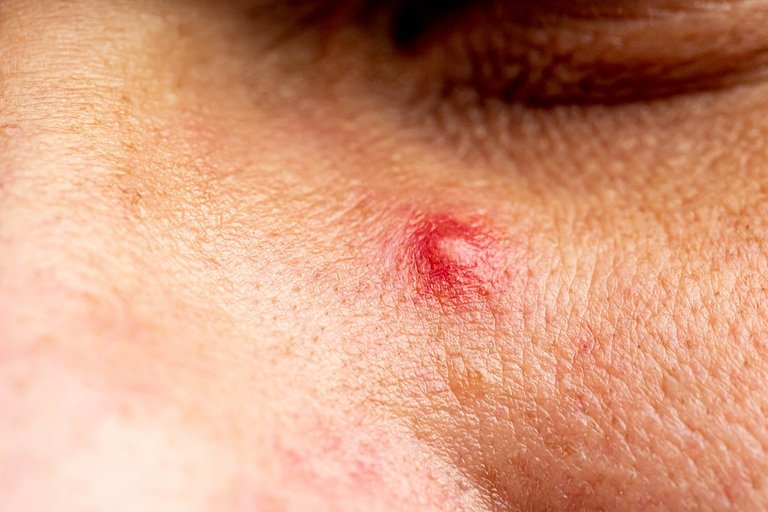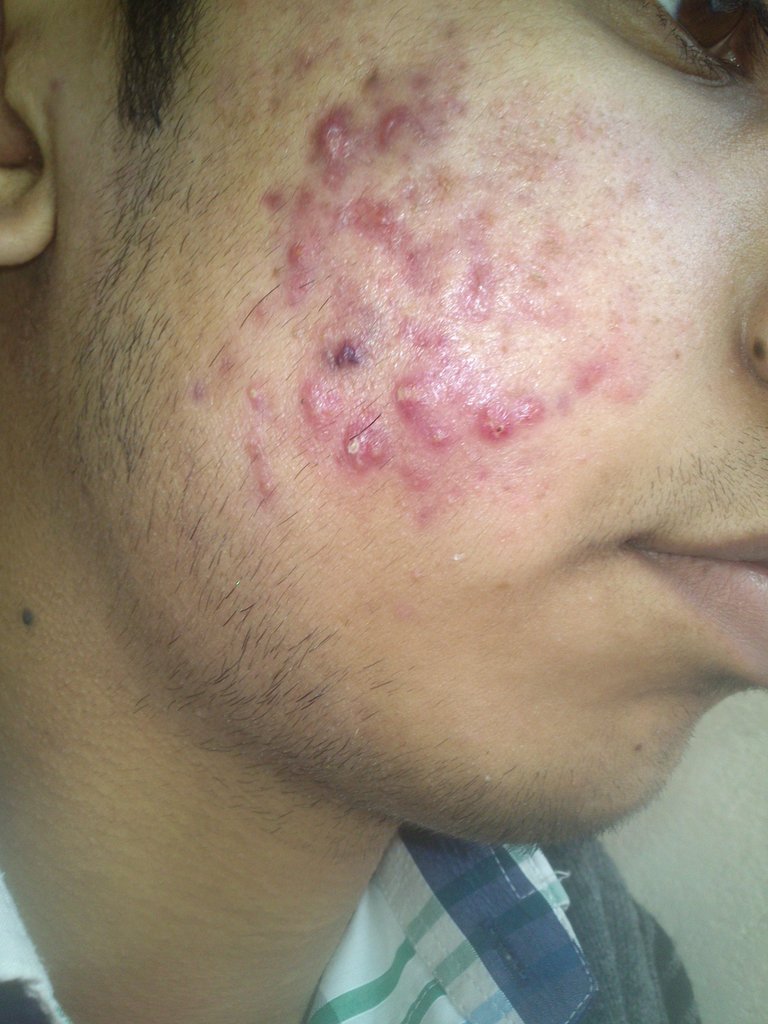There was a time I had pimples on my face and it was becoming a growing concern. Just like myself, every now and then we have this pimple, zits, spot or whatever name you call them on our face, and the first thing that comes to mind is to squeeze to burst them. The habit of bursting this pimple is common among over 70% of people so I can say that I am one of the few who doesn't squeeze to burst, instead I will either leave or find a way to treat.
Acne Vulgaris or Acne as you might know it to be happen as a result of the skins natural make up where we have hairs from tiny holes on the skin. The hair follicles on the skin is made up of glands known as the sebaceous gland which produces sebum which is a oily substance that moisturizes the skin. As you would expect that for every good thing, there might be a negative implication of too much. That said, too much sebum can lead to the clogging of the follicles and pores because they combine with dead skin cells. This clogging isn't a big problem until bacteria like Cutibacterium, or Propionibacterium begin to feed on the sebum and infect the pores. This bacteria produces fatty acids that deactivates the enzymes that prevents inflammation in the skin cells.
With inflammation comes white blood cells to the area since the immune response has been triggered. This immune response leads to the production of Purulent Exudate known as PUS. That said, as a child, my uncle would tell me not to touch his pimples because they were contagious but in reality, they are not contagious but this doesn't mean you cannot have them because it can appear on the body of anyone provided there are sebaceous glands present there. These areas can range from the face, neck, shoulders, chest, and back. But there are more sebaceous glands in the face than any other part of the body especially around the T-zone of the body which includes the Forehead, the Nose and the Chin.
Why are majority of people with Acne teenagers and not infants. This is because it requires excess amount of sebum for this to happen which means that hormones will play a major role in its formation and hormones are in their peak during teenage ages. Hormones like testosterone which spikes during teenage years is why adolescent boys tend to have acne compared to adolescent girls but this changes as they grow older with adult women having more acne than adult men because of hormonal changes that occur as a result of menstruation, pregnancy, and breast feeding. The good news is that the older the less likely to have acne but when acne happens in adult, it is usually on the lower area of the face compared to acne in teenagers which is usually on the forehead or upper half of the face.
Acne can come in different types ranging from Comedo acne which are of two types either Whiteheads or Blackheads. In blackhead acne, the pores are opened which leads to the pus being oxidized giving it the dark color while in whitehead acne, the pores are closed. Both types of acne can lead to Pustules or what you know as pimple when they are inflamed. They can also form Papules which are bumps under the skins. This acne can also exists as Cysts and Nodules.
I see a lot of people popping pimples but one of the reasons why I personally do not subscribe to that school of thought is permanent scaring. When pimple are not popped the right way, they can lead to scaring and if this pimple now contain infected pus, then the pus can infect other pores on the skin causing another cycle of pimple in the area. Doing it wrongly can even lead to clogging the pores more which would in turn cause severe inflammation.
Well, I do not advise that pimples be popped but if you insists on popping them, then adhere to these warnings. Never pop pimples around the Nose regions because the veins that feeds the eye socket runs through this region then to the Cavinus Sinus which goes to the brain and clotting in this area can be dangerous. Also if you want to pop the pimple on your face, then you can pop whitehead, blackhead, and pustule only. It is advisable to always wash the face properly and wash the hand then use warm water to loosen the excess sebum so as to allow for easy removal of the sebum. Pull the surrounding skin away from the pimple and push down with little pressure to allow the pus to come out after which it should be cleaned with cotton wool and sterilized with rubbing alcohol.
Reference
https://www.medicaljournals.se/acta/content/html/10.2340/00015555-1998
https://www.aad.org/media/stats-numbers
https://www.everydayhealth.com/skin-beauty/acne/10-surprising-causes-acne-adults/
https://pmc.ncbi.nlm.nih.gov/articles/PMC6560440/
https://pmc.ncbi.nlm.nih.gov/articles/PMC2836431/
https://onlinelibrary.wiley.com/doi/abs/10.1046/j.1365-4362.2003.01540.x
https://www.nhs.uk/conditions/acne/causes/
https://www.sciencealert.com/researchers-think-they-ve-finally-figured-out-why-bacteria-only-causes-acne-in-some-people
https://onlinelibrary.wiley.com/doi/full/10.1111/j.1600-0625.2009.00924.x


I personally do not touch pimples on my face
I don't even touch my face that much, talk more of letting another touch it
The only time I let someone touch my face was when all the pimples had dried up, turning into black spot.
It's advisable to visit a dermatologist to treat acne, some of them might be a clinical manifestation of an underlying ailment
Thanks for your contribution to the STEMsocial community. Feel free to join us on discord to get to know the rest of us!
Please consider delegating to the @stemsocial account (85% of the curation rewards are returned).
Thanks for including @stemsocial as a beneficiary, which gives you stronger support.